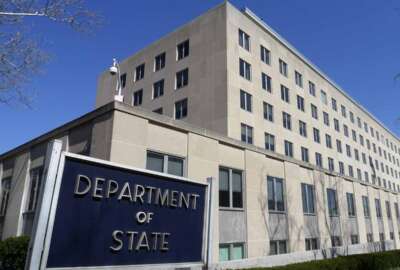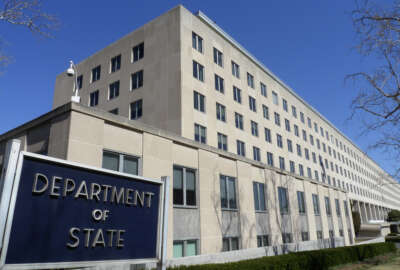How one big State Department bureau is updating its approach to cybersecurity
A crucial part of the State Department has a new head of crucial function at a time of high world tension.
Best listening experience is on Chrome, Firefox or Safari. Subscribe to Federal Drive’s daily audio interviews on Apple Podcasts or PodcastOne.
A crucial part of the State Department has a new head of crucial function at a time of high world tension. Erica Jaume is the chief of the IT Security and Governance Branch of the Bureau of Educational and Cultural Affairs, and she joined the Federal Drive with Tom Temin for more discussion.
Interview transcript:
Tom Temin: Ms. Jaume, good to have you on.
Erica Jaume: Hey, good morning. Thanks for having me.
Tom Temin: Now, you’re fairly new to this job the last couple months, I guess. And let’s begin with the Educational and Cultural Affairs branch – Bureau, I should say, itself. What does it do in State and how does it fit into the whole State picture?
Erica Jaume: Yeah, we have a very interesting mission. The whole State Department does a wonderful job with diplomacy overseas, specifically our organization and few others. But our organization focuses on leading department efforts to expand and strengthen a lot of the relationships that we have from a U.S. entity overseas. So we work with foreign governments, their citizens, and we really help to build national interest, bringing to light opportunities things professionally, educationally and culturally, really, to exchange individuals work with them to bring them over here, highlight opportunities within the U.S. And, some of the most amazing things that I’ve heard are we build those lifetime bonds with individuals overseas so that they become part of State Department, they want to come back, they want to work with the State Department as some of our Foreign Service. So we’ve got that unique mission of having that soft touch point overseas with getting people interested in the federal government, the U.S. in general.
Tom Temin: And let’s talk about the IT Security and Governance branch. I get IT and security but governance, tell us what your job is.
Erica Jaume: This is a fairly new branch over here in the Bureau of Education and Cultural Affairs. We’re looking at how we can strengthen the bond for IT building into the mission. So we’re looking at any kind of governance around how we implement systems, how we bring IT security towards the those federal government systems within educational cultural affairs. It’s long been known that there are mandates, there are acts that tie the systems into secure posture, but that governance we’re looking to enforce and put in place and that program to build around, it really ties into how we do it, how management is communicated on, how we identify opportunities to continuously improve. We want to build up that opportunity for the Bureau so that we can help continuing to support their mission, their intent on bringing innovation, highlighting and and building that trust with overseas partners.
Tom Temin: How does it tie into the overall state IT structure? I mean, there is a State CIO.
Erica Jaume: So each one of the bureaus within the State Department has their own initiative. It’s kind of like segmenting our missions. Where the department CIO has ultimate responsibility for the agency, we report on a lot of our systems, we report on all of our systems, all of our purchases, everything that aligns to IT up through the chain of command into the department CIO. He has that ultimate, or he or she, has that ultimate responsibility for department direction in IT systems. So we look towards them to provide us with anything from capital to staffing to guidance. They do all of the coordination outside of the department, with agencies such as CISA [Cybersecurity and Infrastructure Security Agency] or anyone else where we really need to gain support. I found it really interesting in the last month, we received a lot of support from the ECA department CIO’s office in areas where we were hoping to leverage them and kick off conversations with other agencies. So they’re really there to strengthen those ties and build around opportunities to partner with other agencies where, happening within a bureau, we do work directly with external agencies, and their IT shops, but sometimes we don’t get as much direct engagement with them because it’s not, our mission’s so small compared to the department CIO’s clout and their impacts across the board.
Tom Temin: Sure. We’re speaking with Erica Jaume, she is chief of the IT Security and Governance Branch of the Bureau of Educational and Cultural Affairs at the State Department. And does the Bureau of Educational and Cultural Affairs have applications of its own that are those mission related that are separate from the State Department enterprise applications? Do you have your own applications to look over and make sure they’re updated and secured and so forth continuously?
Erica Jaume: Absolutely. So every Bureau has their own applications that are dedicated to towards their mission. Their applications branch chief, who’s looking at how we integrate data warehousing enterprise data for the bureau, and then how that even ties into the larger department. Working together we’ll be building out that governance, how we move forward, how we work with the larger department to keep consistency, communications and then also building on opportunities for the department and for our specific mission within the bureau. I’m in good hands as far as the mission goes and the people that surround me the leadership, the support I receive from my colleagues, and then also from the department to get on board with what that mission is and how we interact to support the mission of the Bureau of Educational and Cultural Affairs.
Tom Temin: Aside from zero trust, which almost everybody says in their sleep now reflexively, it’s become the the word of the day, what are some of the other initiatives, priorities for the IT and security branch and for the IT operation at Educational and Cultural Affairs?
Erica Jaume: Cybersecurity focused, we’re looking into, we just received a data call for security opt services from the department. So I’m hopeful and I’m looking forward to the department centralizing security operations, and then leaning heavily on them because there’s a lot of great guidance coming out from the department in the different areas on cybersecurity – doing a lot of initiatives on centralizing communications for anything that comes out for patch management. We had a whole ordeal with the Apache Log4j initiative, we had had an entire organization dedicated to remediating over 120 assets, systems, servers I should say, or systems within our environment to meet that critical need that came out of CISA back in December. And it was incredible the way they did it, they had everybody that had some kind of a tie between all the department bureaus on a call, had a conversation, led the initiative to identify the issue, the challenges, the issues, and dropped in templates. They gave out guidance, they set standards, they set expectations, and they had a reoccurring meeting where everyone would consistently report on the status of remediation of those systems. And that’s how it should be. I found a lot of value in that, meeting my colleagues across the department, and then exchanging information. They’ve done such a great job in such a short period of time that ECA’s OCIO has been on board.
Tom Temin: Sure, and your prior job, which is where we first encountered you, you were a technology accelerator-type person. Tell us what that was, mainly for how it’s informing what you’re doing in the new job? What did you learn as an accelerator of technology? Had your pedal to the metal.
Erica Jaume: Of course. So that vision, that came out of this extremely strong individual that I used to work with, she was my supervisor, indirect supervisor, I would call her a senior adviser. She’s been with the State Department and previously with Army Corps, she had this vision of putting in place the technology accelerator program, and bringing opportunities to my former Bureau, which was the Bureau of Overseas Buildings Operations. Things like IOT things, that the department is working on, but getting it specifically for construction, or specifically for the business within construction and facility management or anything for embassies overseas. So we were looking at bringing that latest innovative technology to the parameters of the embassies in construction or in maintenance. And that was a critical piece of the organization. It led a jumping off point to a lot of areas of opportunity, one of the most, one of the ones that is currently still being run by – the CIO – is called the OBO Smart Building Solution. And so they’re looking at putting in place opportunities to aggregate the data. And it all seems like this is old news. But for the federal government, this is resounding information where you’re pulling back an entire network of smart building services. I mean, you walk through a mall garage, how often do you see, there’s little green lights on the parking spots that say, oh there’s a spot available, versus it’s red, it’s not available. So things like that, figuring out how many cars are sitting in a parking lot, and at an embassy and pulling it back. You still don’t find those in many of the buildings in private industry. So they’re doing a great job.
Tom Temin: All right. And final question: So are you an IT person, or a State person or a little both?
Erica Jaume: I’m both, I would say both. I think the mission drives me independently. But IT individually has been my core focus for the last 12, 15 years. So I’ve been a federal employee 10 years and then before that contracted, seems like so long ago now. I think I was contracted for five years. So State definitely, prior to that I was at Homeland Security. Loving every bit of State Department though, I feel so close with the mission now that I’m part of a bureau. So it’s been excellent.
Tom Temin: Erica Jaume is chief of the IT Security and Governance Branch of the Bureau of Educational and Cultural Affairs at the State Department. Thanks so much for joining me.
Erica Jaume: You’re welcome. Thank you, sir.
Copyright © 2024 Federal News Network. All rights reserved. This website is not intended for users located within the European Economic Area.
Tom Temin is host of the Federal Drive and has been providing insight on federal technology and management issues for more than 30 years.
Follow @tteminWFED






